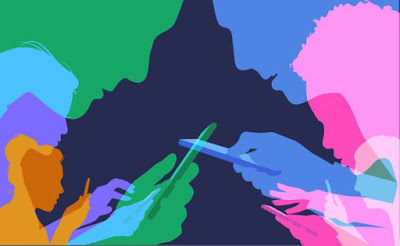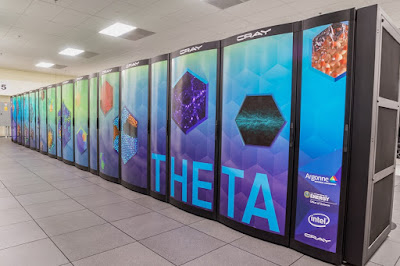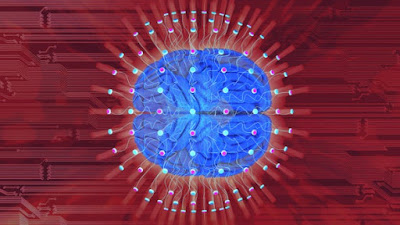 |
| Credit: Getty Images |
Topics: Civics, Civil Rights, Internet, Existentialism, Politics
Last month, I temporarily deactivated my Twitter account following a colossal dump of racist abuse into my feed, including a man in Texas whipping up his followers to phone into an NPR radio show on which I was a guest to ask about “white genocide.” Others played a guessing game around my skin color in the belief this would help them gauge my IQ. On YouTube, one of the editors of Mankind Quarterly, a pseudoscientific journal founded after the Second World War to argue against desegregation and racial mixing, imitated me by dressing up in an “Indian shirt” (I am British; my parents were born in India). The comments underneath said I should I go back to where I came from.
It’s just another day online.
The Internet Is a Cesspool of Racist Pseudoscience
Angela Saini, Scientific American and author of Superior: The Return of Race Science
I will take a week off before classes start in the fall.
The Internet is a development of science as well as the military-industrial complex. Scientists, engineers and librarians used as "FTP" - file transfer protocol, which predates what we've come to recognize as HTTP - hypertext transfer protocol. If you peruse DARPA's website, there is historical reference to the idea of something that would survive a thermonuclear attack. The previous communications protocols from WWII was a "hub-spoke" configuration: thinking of a wagon wheel, the hub was at the center and typically the headquarters for deployed assets in theater. The spokes were distant users of the communications network the hub would have set up with an engineering design called a communications plan (in a previous life, I was that person as an Air Force Communications/Computer Systems Officer). Thus the enemy - presumed the USSR during the Cold War - would simply destroy the hub and the spokes would be in the dark and disconnected, or deploy an EMP - electromagnetic pulse, exploding a nuclear device in atmosphere, disrupting most if not all high frequency transmissions. The idea of a "web" was so that could not occur.
The network involved satellites of course, and the distant users were tied to the hub with troposphere line-of-sight microwave horns, radio frequency equipment that multiplexed voice and digital through encrypted teletype, audio and digital switches. It was a beautiful thing to witness when it all worked.
What is developed for the government like Velcro eventually gets to the masses. AOL is an ancient form of email and web browsing that required dial-up phones and a loud modem. Netscape was the first attempt at commercial web design software, relying mostly on the aforementioned HTTP. Before social media, people started bantering or bickering back-and-forth on message boards or would send "flame mail" trying to make a point. When using company assets to send witticism or derogatory commentary, many then and now found themselves in the unemployment lines. As I alluded to in Filter and Subtext, what particularly used to happen as a societal breaking mechanism - editors in the case of print media; producers for film - pretty much no longer exists. One may publish their first thoughts, misspelled and grammar failing; grainy, amateurish film made on cheap laptops or with cellphone cameras. Any pointing to written errors labels you a grammar Nazi; any video has to be "true" because it's on the Internet with high views. The ready access to information has led to the dangerous belief that no one has to train and become expert in a field to have an informed opinion.
The Internet is both falsely empowering and the source of demographic demarcation: by having the ability to get anything in an instant gives the impression that you KNOW a subject. As a person that reads academic papers for a living, I can assure you in the first read of any paper, I won't know the subject. I will read the abstract several times followed by the introduction, experimental procedure; results and conclusions. I will read some of the papers in the references. There are words, phrases and either physical or chemical compounds I'm not familiar with (Google). I write things down; take notes. I work through the formulas in the paper so I can understand them. It is a tedious, grinding process that takes time. I recall a maxim in the martial arts: "a black belt is a white belt that never quit." So it is with building any level of expertise in well...anything. By choosing "news feeds" instead of reading morning and evening print media as well as three main networks essentially reciting from the same Associated Press scriptures, we automatically place ourselves in silos that when we try to converse with one another, devolve into electronic and actual shouting matches.
Tom Nichols is a college professor at the US Naval War College, occasional opinion contributor on MSNBC and until recently, was a member of the Republican Party. In his treatise "The Death of Expertise," he points to a disdain of experts on the right and the left; the confusion of confirmation bias (finding the thing that you already agree with confirming what you already believe) as "evidence" your position and opinions are true. This likely parallels the transistorizing of the cumbersome and large hub-spoke network into our hip pockets. It may empower those unfamiliar with the Dunning-Kruger Effect that despite their sense of empowerment, they may be way out over their skis. They might tweet the first thing that comes to mind while sitting on the loo during "executive time." In such a world, everyone's an expert and no one is for the most part humble enough to admit they might be wrong or at least misinformed about a subject. In such a world, the warming temperatures are ignored and the science is scrubbed from government sites as "inconvenient" to the stated China hoax theory. In such a world, pseudoscience is pushed in every corridor of existence as "free speech" and "teach the [faux] controversy." Facts won't matter: There is still a Flat Earth Society in the 21st century (with a website). There are still conspiracy theorists that think the Moon landing was faked. In such a world, the chimera list of wrong-headed things that can be believed: Alt-Right (Wrong) racist tropes, Bigfoot, the Clinton's murdering people or running child sex rings; crisis actors at mass shootings, E.T., fascism (aided and abetted by our own cleverness per a virtual Yuval Noah Harari at TED); flying saucers, Godzilla, Loch Ness Monster, Neo Nazis, Ouija boards, Pizza Gate, poltergeists, Q-Anon is almost endless, but not ONE can bother to read the Mueller Report or believe that our election processes were as attacked as the Twin Towers of the World Trade Center and walls of the Pentagon fell to ruinous rubble on 9/11.
The FBI intelligence bulletin from the bureau’s Phoenix field office, dated May 30, 2019, describes “conspiracy theory-driven domestic extremists,” as a growing threat, and notes that it is the first such report to do so. It lists a number of arrests, including some that haven’t been publicized, related to violent incidents motivated by fringe beliefs.
The document specifically mentions QAnon, a shadowy network that believes in a deep state conspiracy against President Trump, and Pizzagate, the theory that a pedophile ring including Clinton associates was being run out of the basement of a Washington, D.C., pizza restaurant (which didn’t actually have a basement).
“The FBI assesses these conspiracy theories very likely will emerge, spread, and evolve in the modern information marketplace, occasionally driving both groups and individual extremists to carry out criminal or violent acts,” the document states. It also goes on to say the FBI believes conspiracy theory-driven extremists are likely to increase during the 2020 presidential election cycle.
Exclusive: FBI document warns conspiracy theories are a new domestic terrorism threat
Jana Winter, Yahoo News
"Then you will know the truth, and the truth will set you free." John 8:32
In such a world, truth itself becomes a casualty, and the opposite of freeing truths is slavery.





